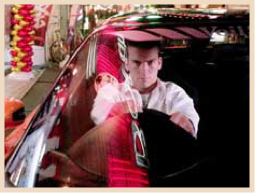
Todd Jay Leonard, Blog


Japan is a safe country. Generally speaking, this statement is true when comparing Japan to most other countries. In fact, Tokyo, one of the world's largest cities, is quite safe when compared to other big cities around the planet.
For instance, when walking down a dark street in Tokyo alone, I never feel anxious or uneasy about walking late at night in an unfamiliar area. However, as soon as I get to the United States, I have my guard up. I am much more aware of others around me, even in places I know well such as Indianapolis.
Not long ago, an American friend and I were walking down a narrow street in Tokyo when a group of leather-clad teens with punked-out pink and green spiked hair, dressed menacingly with skulls and crossbones on their jackets, adorned with chunky chains as fashion accessories, came strutting toward us.
Neither of us flinched or even paid them any mind at all except to comment that if we had been in New York or Los Angeles and a gang of boys approached dressed in a similar fashion, we both would have been on high alert, vigilantly eyeing their every move.
This sense of security when traveling or living in Japan is one of its greatest assets for not only Japanese people but for foreign visitors as well. Crimes against foreigners are virtually unheard of here, making Japan a popular travel destination, especially for women.
The low crime rate in Japan may be attributed to its Confucian ideals found in Buddhism and in its own indigenous religion of Shinto. Throughout Japanese history, Shinto and Buddhist beliefs advocating nonviolence have been a cornerstone of its religious and "moral" education.
During the Tokugawa Shogunate (1603-1867), samurai warriors were in charge of keeping the peace and did so with iron hands. Reportedly, they were even permitted to execute people on the spot for minor infractions such as impoliteness or breaking the law--things that people in modern society routinely do with impunity.
This history and tradition has translated into a modern society that is largely honest and law-abiding. When I first arrived in Japan, I had to watch myself at crosswalks because I would sometimes cross when it was red if there were no cars in sight; Japanese people, on the other hand, will stand and wait until the walk sign lights up. I don't want to be a bad influence, so I now wait until the light turns before crossing.
Drivers here, though, do run red lights as a matter of course. The opposite light stays red for a couple of extra seconds to allow the stragglers to get through before the other light turns green. This is a definite no-no in the United States. Many a ticket has been issued to such drivers for running a red light. In Japan, it is expected, and everyone does it.
Japan is notorious for having mislaid or forgotten items on trains returned to the person who lost them. I have left the occasional bag or odd umbrella (or two) in a taxi or on a bus or train; each time I was able to get my belongings back because some Good Samaritan took the item to the lost-and-found office or gave it to the driver.
I always warn my students who are visiting a foreign country to be vigilant and careful because they are not used to worrying about scam artists, con men, or thieves who might take advantage of their naivete as first-time travelers.
Routinely in Japan, Japanese people will board a train, place their bag or briefcase on a shelf above their seat, and promptly fall asleep. When they reach the station where they want to get off, they jump up and grab their belongings, then head out the door. The whole time they are riding on the train, they appear to be asleep (or at least playing possum).
You cannot do this on a New York subway train. Your bag most likely won't be there when you wake up. So, I try to give my students some simple, but smart travel tips before they leave.
In Japan, it is common for Japanese travelers to find an empty seat at a train station or in an airport to leave their bags while they do some last-minute shopping, use a public phone or go to the toilet. Again, this is unwise in other countries, because someone will probably see the bag and take it. Also, with terrorism on everyone's mind, others may be suspicious of an unattended bag sitting alone on a seat in a public place.
I also caution my students not to venture into unknown areas at night or alone when abroad. It is fun and adventurous to explore new places, but they have to be smart about it, research the area and go to places where there are a lot of people around. This is the reality of traveling abroad in most places other than Japan.
This is not to say, however, that Japan is "crime-free," because it's not. It is rarer here, and when someone is attacked--or worse, murdered--it makes national headlines. A disturbing trend that has been occurring more frequently is crimes against children who are abducted and often killed.
Youth-generated crime has increased at an alarming rate in the last several years. Once unheard of, it is now becoming more and more frequent. A number of years ago, a boy killed his classmate, severed the head and placed it at the front gate of his school. More recently, a young boy kidnapped a toddler from a store where the parents were shopping, took him to a parking garage, mutilated the toddler and then threw him over the side.
This rash of violent crimes committed by children against children has been in the news more frequently in recent years here. Of course, similar heinous crimes against children in America are almost commonplace, to the point where people are desensitized to it when it does happen. In Japan, it is still rare enough that the media is right on it, and it causes the nation collectively to gasp in horror.
The authorities here, as well as educators, are trying to understand why this disturbing trend is happening. Like most first-world countries that are industrialized and wealthy, the rapid transformation of Japan regarding its social attitudes, standard of living and culture has outpaced the ability of society to digest the changes in a way that teaches its youth a sense of propriety, giving them a social conscience to know right from wrong.
Sadly, it happened in the United States, and I fear it is happening in Japan.
By TODD JAY LEONARD
Columnist
Japan's pretty safe, but youth crime rate is rising
Monday, June 19, 2006







